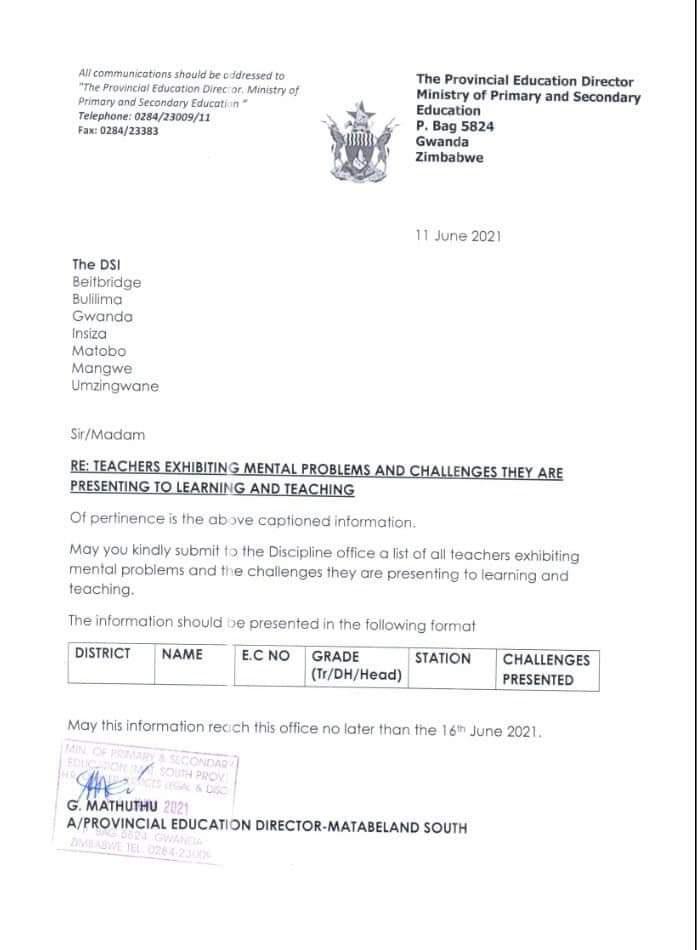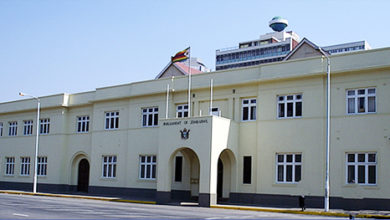Zim teachers struggling with mental health

SOME teachers are reportedly struggling with mental health problems a situation which has been attributed to work overload and low remuneration.
Teachers have been confronting the government to improve their working conditions with the highest-paid teachers currently earning ZWL$22 000 a month.
The sector is demanding are demanding an equivalent of US$520 for the lowest paid worker.
Challenges of mental wellness amongst teachers were revealed when the Office of the Matabeleland South Provincial Education Director sent a circular to the District Schools Inspector for Beitbridge, Bulilima, Gwana, Insiza, Matobo, Mangwe and Umzingwane to submit a list of all teachers exhibiting mental problems and challenges they are presenting to learning and teaching.

In an interview with CITE in light of what the government would do to ease this burden, Director of Communications and Advocacy in the Ministry of Primary and Secondary Education, Taungana Ndoro, said the government is committed to improving the well being of teachers.
“We are taking note of any of our staff members that may have mental health concerns and we are moving towards having them attended to professionally so that we deliver our mandate of quality and wholesome provision of education for all Zimbabweans,” he said.
Ndoro said it was the education ministry’s intention that all teachers live in a state of well-being in which they “realised their own abilities, cope with normal stresses of life, work productively, fruitfully, and are able to make a meaningful contribution to their communities.”
“Looking after mental health preserves our teacher’s ability to enjoy life. Doing this involves reaching a balance between life activities, responsibilities and efforts to achieve psychological resilience.”
He indicated that teaching was a stressful and challenging career and the education ministry had a department that was offering psychosocial support.
“Conditions such as stress, depression and anxiety can all affect mental health and disrupt a teacher’s routine. We, therefore, have a very vibrant Learner Welfare, Psychological Services and Special Needs division headed by a Chief Director and this division has competent psychologists in all our provinces to deal with any mental health concerns amongst our staff,” Ndoro said.
Commenting on the matter, the National President of the Amalgamated Rural Teachers Union of Zimbabwe (ARTUZ), Obert Masaraure, said the move by the education ministry was a sign that authorities knew the burden faced by teachers.
“It is clear the government is well aware that the burden of overwork and underpayment may be taking a toll on the teachers. Mental health challenges cannot be ruled out when teachers are overworked like slaves but are denied access to basics like healthcare, dignified sanctuary and food among others,” he said.
Masaraure lamented that instead of addressing the core reasons behind mental challenges, the government was opting to address symptoms.
“The slave drivers – government officials – are trying to deal with one of the symptoms of the incapacitation crisis, mental health. We however insist that the only way out of this crisis is to pay teachers a living wage. Teachers should receive the pre-October 2018 salaries, a minimum of USD 520,” said the union leader.
A social analyst, Khanyile Mlotshwa urged the government to improve the welfare of teachers and concurred poor working conditions were contributory to their mental illness.
“It will not be surprising to hear there’s an increase in prescribed antidepressant medication. This must ring alarm bells for the government and policymakers to deal with conditions of service for teachers and other workers,” he said.
“Relevant authorities must make sure that teachers are nurtured and supported plus Covid-19 is another issue that has disrupted lives of many professionals and individuals who are struggling to cope in these uncertain times.”






